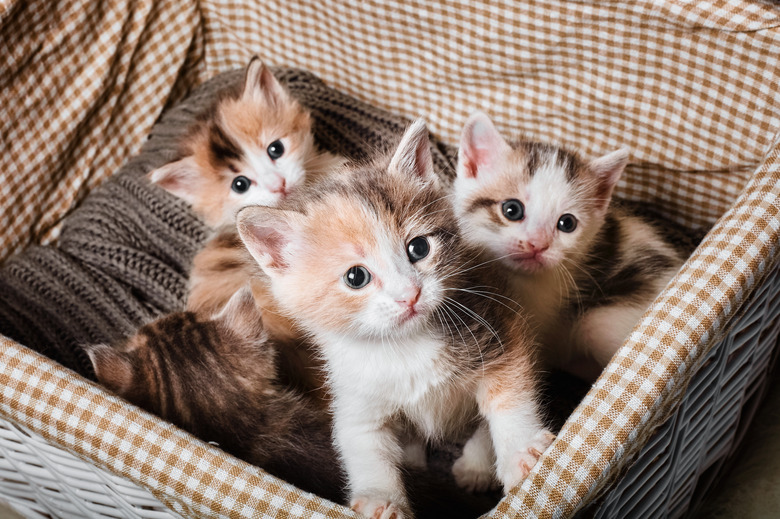What And When Is Kitten Season?
"Kitten season" sounds like a whimsical folktale of purring, sweet-faced kittens floating on fluffy clouds and raining from the sky, softly landing on purple toadstools amidst fluttering butterflies. However, in reality, kitten season is a chaotic (if cute) time when many litters of feral and stray kittens are born.
During kitten season, shelters often become overwhelmed with the flood of kittens, some of whom need intense hands-on care. Consequently, kitten season is a difficult and stressful time for many shelters and their staff and volunteers.
When is kitten season?
When is kitten season?
Kitten season is sparked by the days getting longer, thus kicks off in early spring in many states. As the days get warmer in most places in the United States, kitten season is already in full swing and may last until fall in some cases. In warmer places like Florida, hot summers and mild winters are conducive to year-round breeding, so kitten season lasts all year long.
What is kitten season?
What is kitten season?
Kitten season defines the period in which female cats deliver oodles upon oodles of kittens, one litter after another. Most animals mate and give birth in spring due to longer days and mild temperatures which gives access to more food meaning higher survival rates for the offspring. But, unlike other animals, cats can continue to reproduce until the weather turns cold.
Since the female cat's reproductive cycle is influenced by warmer weather and the amount of daylight in a 24-hour period, as the winter solstice of December 21 approaches and the days get longer, an intact female's cycle is triggered and her first heat arrives by January 15. With a gestation period of about 60 days, the first litters of the kitten season start arriving around March 15 every year.
Kitten season continues as the year progresses towards the vernal equinox on September 21, and since the amount of daylight is decreasing, the feline reproductive cycle also decreases.
Help by spaying and neutering your cats
Help by spaying and neutering your cats
Everyone can make a difference during kitten season, and first and foremost is ensuring your cat does not have unwanted kittens. It starts by spaying your female cat or neutering your male cat, especially if she or he goes outside — even just in the backyard.
Once the babies are weaned and old enough, they are spayed, neutered, and adopted. The queen will also be spayed, and depending on her temperament or potential for domestication, may either be fostered for socialization then adopted, or returned to the area where she was found. Often, feral adults who have had no positive contact with humans in their entire lives cannot be successfully domesticated. Trap, spay, neuter, and return programs, known as TNR, throughout the country have proven to be a successful tool for reducing unwanted kittens.
Help by fostering orphaned kittens
Help by fostering orphaned kittens
During kitten season, fostering a litter of orphaned kittens offers a rewarding opportunity to save lives. And for animal lovers, it can be a wonderful life experience, and many continue fostering kittens year after year. Many people choose to foster moms and babies together. In this case, mother cat looks after her babies and you care for her.
Or you can choose to foster kittens at various stages depending on your capabilities, experience, and the level of care you wish to provide.
If you are interested in fostering, consider the following kitten groups who are often in need:
- Newborn or Neonate Kittens: Ranging in age from newborn to about four weeks old, these kittens require bottle feedings every four to six hours 24/7. When a kitten is about three weeks old, he can start going up to eight hours overnight without a feeding. Generally, only volunteers with experience in raising kittens will qualify. Also, kittens at this age need to be stimulated to urinate and defecate every few hours.
- Transitional Kittens: These four- to six-week old orphan kittens need to be separated from their mother for some reason. At this stage they are just starting to eat solid food, but may require supplemental bottle feedings a couple of times a day.
- Weaned Kittens: Ranging in age from five to more than eight weeks old and eating solid food, weaned kittens are the most entertaining age group to foster. With their hilarious, super-energetic antics, these cuddly kitties can melt your heart and often are adopted by their foster family. Kittens remain in foster care until they are a minimum of 8 weeks old and two pounds at which time they are ready to be spayed and neutered.
- Kittens Needing Socialization: Feral kittens who arrive at the shelter often have had little to no contact previously with humans. They need to be socialized before qualifying for adoption. With proper handling, love, and attention, kittens younger than about four months old can be socialized. If fostering one or more kittens in this group appeals to you, many shelters/rescues offer special training.
The best part of fostering kittens is that you get first dibs at adoption! Be careful, though, it's hard to choose just one.
What to do if you find a litter of kittens
What to do if you find a litter of kittens
If you find a litter of kittens outdoors, don't assume they are abandoned. Leave them where they are and monitor them from a distance every couple of hours over a period of 12 to 18 hours. If they seem well-cared for and not in distress, chances are their mother will return. If the mama cat does not come back within a couple of days, take the babies to your vet, a rescue, or a community TNR agency.
After placing the kittens safely, be prepared to follow-up and watch for mom cat to return to the area where you found the kittens, and report to the rescue so they can come out and trap her, or you may be asked to place a trap and work with the rescue or TNR program toward the goal of reuniting the family.



